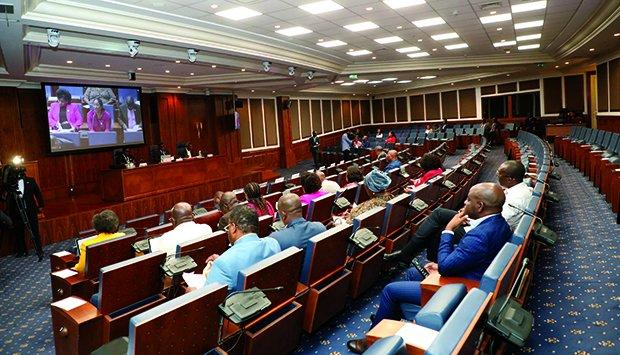Africa-Press – Angola. Prenatal and postpartum leave, with or without pay, and the introduction of a new legal figure that will regulate parental leave of seven days, framed in the seventh chapter of the General Labor Law Proposal (LGT) were discussed , yesterday, on the sixth day of debates between deputies and representatives of the Executive.
The chapter debated by specialty in the National Assembly was voted by 35 votes in favour, zero against and an equal number of abstentions, whose objective is to regulate the next LGT, as well as the issue of remuneration for work and other economic and social rights of employees in each employment circumstance.
According to the Secretary of State for Work and Social Security, Pedro Filipe, prenatal and postpartum leave, with or without pay, and the introduction of the new legal figure that will regulate the seven-day parental leave should deserve legal clarification in order not to trample the worker’s potestative right.
The seven-day parental leave, without the right to remuneration, stressed Pedro Filipe, being a new figure in the LGT Proposal under debate, must be seen in such a way that it does not distort the legal-labor relationship.
One of the issues that was seen as worrying, underlined the representative of the Executive, is the question of the number of parental leave per year, taking into account that many employees have more than one marital relationship and are still in the reproductive phase.
The Secretary of State for Labor and Social Security referred that, given this socio-anthropological nature, the proponent of the proposal (Executive) is open to all amendments and contributions from legislators, as long as they bring harmony.
Because it is a potestative right, that is, one that does not admit disputes, in which its use is at the exclusive freedom of the holder, explained Pedro Filipe, the analysis must have clarity, cohesion and legal logic.
As for prenatal and postpartum maternal leave, stressed the Secretary of State for Labor and Social Security, the LGT Proposal provides for three months of the current law and 30 days will be added, with the aim of ensuring the mother’s physical stability and emotional to the child.
In reaction to the “sensitive” concern, deputy Esteves Hilário, from the MPLA, said that more than defending polygamy, which is not the case, the proposal just wants to protect the son from the rights and duties of the father as an employee.
The parliamentarian referred that the position of many deputies in defending and in only looking at the protection of the child and not in the number of times the worker will apply for licenses does not mean that one is in favor of monogamy or even against polygamy.
What is intended to be found in the debate, stressed the deputy, is the consensus that will guarantee the protection of the child, based on the rights and duties that the LGT confers on workers in the birth phase.
Bernardo Milonga (MPLA) considered the theme of polygamy “elastic and profound” and that it deserves a separate debate. marital or extramarital relationship.
In Mr Milonga’s view, parental leave, regardless of whether or not it entitles to remuneration, must be taken into account, because it brings a right that will be reflected in the harmonious growth of the child.
Still on the subject of remuneration for work and other economic and social rights of employees, deputy José Semedo (MPLA) asked the proponent of the proposed law for greater clarity in terms of remuneration and justified absences, taking into account the labor component, productivity and performance .
Semedo defined remuneration as a “set of economic services owed by an employer to a worker in return for the work provided by the latter, and in relation to rest periods legally equivalent to the exercise of work”.
Regarding the justified absences that the worker intends to be dismissed during the course of the activity, José Semedo defended that the subject should request it in advance, and not communicate it to the employer later, as happens today in many cases.
The General Inspector of Labour, Vassili Agostinho, considered the debates between the deputies and the proponent of the law proposal to be warm and fruitful, stating that parental leave, technical and professional training, among others, are great novelties for a legal-law relationship. balanced work.
Debates in the National Assembly are taking place today, with the analysis of chapters nine, tenth and eleventh, which will regulate the suspension of the legal-employment relationship, the extinction of the legal-employment relationship and, finally, the final provisions.
For More News And Analysis About Angola Follow Africa-Press






